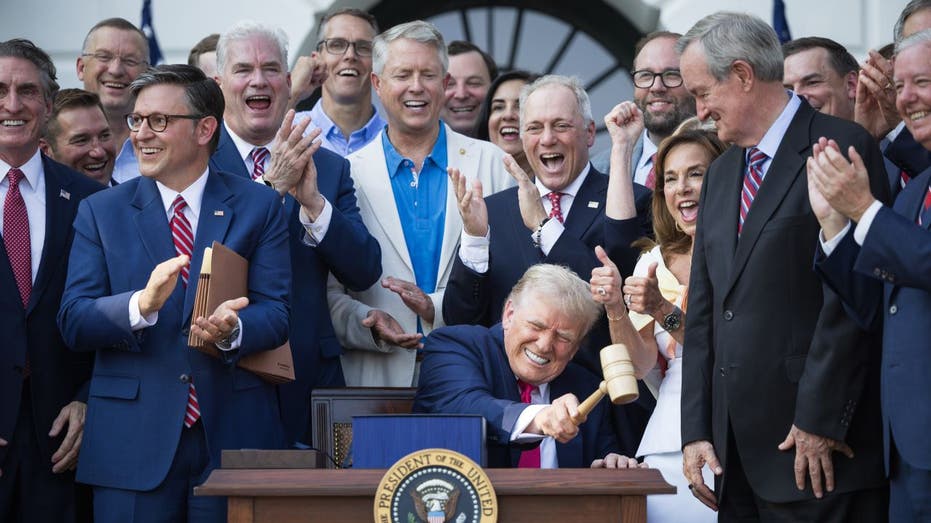The 'big, beautiful bill' reverses Biden-era policies to boost American energy development and production
Law lowers royalty rates for energy producers and allocates $389M to refill Strategic Petroleum Reserve
Secretary Chris Wright touts huge win for energy in Trump's ‘big, beautiful bill’
Energy Secretary Chris Wright joins ‘Varney & Co.’ to discuss the Senate GOP scrapping taxes on solar and wind projects in President Donald Trump's ‘big, beautiful bill’ in an effort to maximize U.S. energy output.
President Donald Trump signed Republicans' signature tax cut and spending package into law last week, which includes several key policies aimed at expanding domestic energy development.
Trump campaigned on reversing Biden administration policies he viewed as constraining American energy development, and the One Big Beautiful Bill Act (OBBBA) contains several key provisions that will aim to boost domestic production.
Here's a look at some of the notable provisions.

The One Big Beautiful Bill Act aims to expand U.S. energy production and cut many clean energy tax credits. (Reuters/Todd Korol / Reuters)
TRUMP'S ENERGY DEPARTMENT WARNS AMERICANS COULD FACE 800 HOURS OF BLACKOUTS BY 2030
Oil and gas development
The OBBBA requires the Department of Interior (DOI) hold regular lease sales for land and waterways under its management and requires the Bureau of Land Management (BLM) to hold quarterly lease sales of available land in nine Western states for the next 10 years.
The bill reverses a key energy provision in the Inflation Reduction Act (IRA), a Biden-era law that Democrats enacted through reconciliation, by reinstating the BLM's authority to issue noncompetitive leases and instead offering them on a "first-come, first-served" basis.
It also restores the pre-IRA royalty rate of 12.5% for onshore energy production and eliminates the IRA's rate of 16.67%, reverses the IRA's offshore royalty rate by reinstating the prior minimum rate of 12.5% and repeals the IRA's royalties on methane extracted from onshore and offshore leases.

President Donald Trump signed the One Big Beautiful Bill Act July 4, 2025. (Tom Brenner For The Washington Post via Getty Images / Getty Images)
TRUMP ADMINISTRATION TO OPEN 13 MILLION ALASKA ACRES TO MINING, DRILLING
Additionally, the law requires BLM to hold lease sales in the Gulf of America, aka the Gulf of Mexico, in the National Petroleum Reserve in Alaska, the Coastal Plain of the Arctic National Wildlife Refuge (ANWR) and in Alaska's Cook Inlet.
The Strategic Petroleum Reserve (SPR) will also be partially refilled under the bill with $171 million allocated for acquiring petroleum products to be stored in the SPR along with $218 million to maintain the SPR.
Revenues from onshore oil and gas leasing will generate a projected $11 billion in revenue over a decade, while offshore leasing adds another $5 billion and Alaskan oil and gas leasing a further $1 billion.
ELECTRICITY PRICES SPIKE FOR AMERICAN HOUSEHOLDS: HERE'S WHAT'S DRIVING COSTS HIGHER

A quiet lake mirrors the snow-capped peaks of the Brooks Range in the Arctic National Wildlife Refuge (iStock / iStock)
Repealing green tax credits
The OBBBA repeals a variety of clean energy tax credits, including tax credits for electric vehicles (EVs) purchased more than 180 days after the bill's enactment. It also ends related credits for used EVs 90 days after enactment.
Tax credits for energy-efficient home improvements are terminated for properties placed in service 180 days after OBBBA's enactment, while the residential clean energy credit is also repealed on that timeline.
Credits for energy-efficient commercial buildings are repealed 12 months after enactment, and the new energy-efficient home credit is repealed for homes acquired 12 months after the bill's enactment.
GET FOX BUSINESS ON THE GO BY CLICKING HERE
A variety of other energy credits are phased out, including for the production of clean hydrogen energy, clean electricity investments and the advanced manufacturing of green technologies.
CRFB estimates the repeal of tax credits for EVs will save $192 billion over a decade, while the phase-out of energy investment, production and manufacturing credits saves an additional $246 billion over that period. Repealing or reforming other Inflation Reduction Act credits saves another $104 billion over 10 years.




















